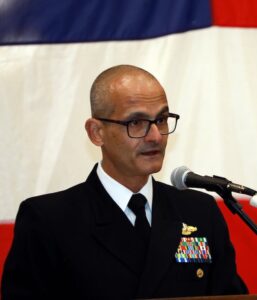
“Fleet Week provides an excellent opportunity to strengthen the bonds between our Navy and this vibrant community,” Valdes said. “This exchange allows military and civilian professionals to share knowledge, explore innovations, and advance our shared goal of delivering world-class health care in some of the most challenging environments.”
The 2024 San Francisco Fleet Week, now in its 43rd year, offers the Bay Area and its residents an opportunity to celebrate and honor the contributions of the men and women of the U.S. Armed Forces. (U.S. Navy photo by Arsenio R. Cortez Jr.)
Story by Arsenio R. Cortez Jr.
Naval Medical Forces Pacific
The 14th Annual Peer-to-Peer Medical Exchange took place Wednesday aboard the USS Tripoli (LHA 7), bringing together military and civilian medical professionals during the 2024 San Francisco Fleet Week.
This collaborative event, organized through a partnership between the U.S. Navy, the University of California, San Francisco (UCSF), and the Fleet Week Center for Humanitarian Assistance, focused on advancing medical readiness and exploring innovations critical to healthcare delivery in challenging environments.
Rear Adm. Guido Valdes, commander of Naval Medical Forces Pacific, director of the Defense Health Network Pacific Rim, and the 14th chief of the Navy Medical Corps, opened the event by expressing his gratitude to the City of San Francisco and emphasizing the significance of such collaborations.
“Fleet Week provides an excellent opportunity to strengthen the bonds between our Navy and this vibrant community,” Valdes said. “This exchange allows military and civilian professionals to share knowledge, explore innovations, and advance our shared goal of delivering world-class health care in some of the most challenging environments.”
Valdes also highlighted Navy Medicine’s critical role not only in supporting military operations but also in humanitarian assistance efforts. He referenced the Navy’s recent missions such as Pacific Partnership, which integrates global health engagement and security cooperation with international partners.
“Whether it’s providing life-saving care in combat zones or offering humanitarian assistance after natural disasters, Navy Medicine is always ready to respond,” Valdes added.
The event featured several sessions on topics ranging from the use of artificial intelligence (AI) in medical settings to pre-hospital whole blood transfusion programs and disaster management. Each speaker provided insights into how new technologies and strategies are being employed to enhance healthcare delivery in austere environments.
Capt. Jeffrey Feinberg, who recently commanded the Navy hospital ship USNS Mercy during the Pacific Partnership missions, spoke about the importance of learning from host nations during international missions. He emphasized the value of learning from countries that achieve excellent results despite limited resources.
“We need to adapt their skills and techniques, especially in dealing with situations where resources are scarce,” Feinberg said. “These nations are ingenious, and there’s a lot we can learn.”
Technological advancements, particularly AI, were a central focus of the discussions. Dr. Omar Badawi, Telemedicine and Advanced Technology Research Center (TATRIC), and chief of Data Sciences for the U.S. Army, expanded on the role of AI in handling mass casualty situations, drawing parallels to Feinberg’s point about resource limitations.
“Imagine a hospital ship suddenly receiving 300 casualties. It would take over 1,200 medics to care for the injured, which isn’t realistic,” Badawi explained. “AI can monitor what’s happening and help guide decisions, especially in austere environments where resources are limited.”
The potential of AI to revolutionize healthcare delivery was further explored by Dr. Christopher Peabody, associate professor, Emergency Medicine, UCSF, and founder and director of UCSF Acute Care Innovation Center, highlighted AI’s role in diagnostics and decision-making. He emphasized the importance of communication and teamwork when integrating AI into medical operations.
“AI is assisting in diagnostics, predicting mortality, and making decisions, but it raises important questions about how it will affect team dynamics,” Peabody said. “We need to ensure that AI is integrated into systems where it complements the teamwork that remains fundamental to patient care.”
Peabody also discussed how AI could be used to automate routine tasks, freeing up nurses and medics for more critical work.
“There are times when we have to use whatever equipment is available, but by integrating analog methods with AI, we can enhance care delivery,” he added.
Disaster management and pre-hospital whole blood transfusions were other key topics at the event. Dr. Chia-Lung Kao, chief executive officer, Regional Emergency Medical Operations Center (REMOC), Taiwan Branch, highlighted the value of international partnerships in disaster management, emphasizing the importance of learning from each other through tabletop exercises and joint operations.
“We have different systems, but by learning and modifying our processes, we can integrate more effectively during real crises,” Kao said.
Dr. CJ Winker, deputy medical director, San Antonio Fire Department, and assistant clinical professor, University of Texas Health San Antonio, Texas, spoke about the revolutionary impact of the pre-hospital whole blood transfusion program, which allows medical personnel to administer life-saving transfusions in the field.
“This program can significantly improve survival rates from combat casualties,” Winker said. “A system of care saves lives, and whole blood is a critical tool in that system.”
He added that AI could one day assist in determining when transfusions are needed, though for now, traditional methods like monitoring blood pressure remain essential.
The Peer-to-Peer Medical Exchange continues to be a vital forum for advancing medical knowledge, improving readiness, and fostering collaboration between military and civilian medical communities.
“The work being done here today will have a lasting impact on both military and civilian healthcare,” Valdes said reaffirming Navy Medicine’s commitment to innovation and partnership.
The 2024 San Francisco Fleet Week, now in its 43rd year, offers the Bay Area and its residents an opportunity to celebrate and honor the contributions of the men and women of the U.S. Armed Forces.